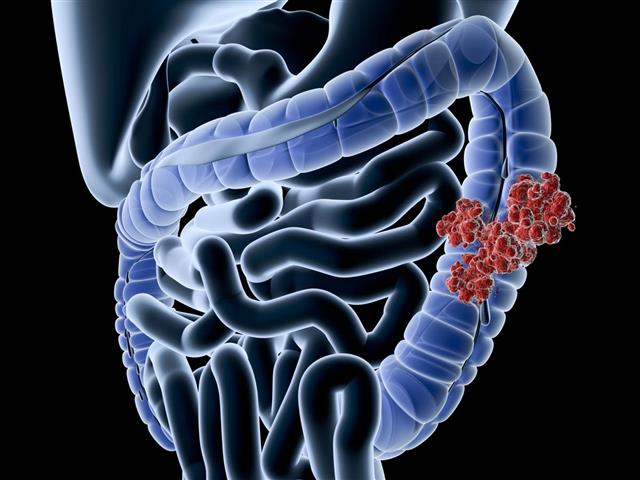
Colorectal cancer refers the cancer of the large intestine (colon) or the rectum. According to CDC, colorectal cancer is the second leading cause of cancer-related deaths in the United States. This HealthHearty write-up provides information on the symptoms of colon cancer in women.
Colon cancer refers to cancer of the large intestine. It arises from the adenomatous polyps, which are protrusions or outgrowths in the colon. Over a period of time, the polyps could turn into cancerous growths. Centers for Disease Control and Prevention (CDC) states that colorectal cancer is the third most common cancer affecting men and women in the United States. The cancerous growth can be detected through colonoscopy procedure.
Symptoms of Colon Cancer in Women
Since cancer of the colon or rectum is the second leading cause of cancer-related deaths, it becomes essential to learn about the symptoms and risk factors of this condition.
Unexplained Weight Loss
Weight loss is a common symptom of all cancers. A tumor in the intestine can obstruct the passage and create a feeling of fullness or bloating sensation. This can be caused due to loss of appetite, which in turn can lead to sudden weight loss
Abdominal Pain and Discomfort
Pain in the abdominal region should not be ignored as it is one of the indications. This may start as a mild ache, followed by a slight pricking or burning sensation in the lower abdomen. As the pain increases in intensity, it can radiate towards the back and pelvic region. This is often accompanied by discomfort and painful spasms in the abdomen.
Abnormal Bleeding
Bleeding in the absence of a menstrual cycle can be a clear sign of bowel cancer. The presence of a considerable amount of blood in the urine or stool should not be ignored. Rectal bleeding can be seen as dark patches of blood in the stool. Bleeding can be sometimes followed by rectal pain.
Change in Bowel Movements
A woman suffering from colon cancer will notice a sudden change in her bowel movements. She will either experience diarrhea or feel constipated.There will also be a change in the consistency of bowel movements. What is important here is the duration for which she experiences these signs. Medical help must be sought if the affected person experiences these symptoms for over 2 weeks.
Fatigue
Fatigue is the most common symptom of cancer. Again, not every case of fatigue should be associated with cancer. Affected person may experience severe fatigue because of higher number of calories being burnt because of the tumor. Affected women may also turn anemic due to abnormal bleeding. Severe fatigue is also associated with anemia.
Digestive Ailments
Other digestive problems, apart from rectal bleeding and change in bowel movements, include nausea and vomiting. Unrelated bloating happens due to blockage due to the tumor in the large intestine. Cramps in lower abdominal area and excessive gas are also few signs.
Experts say that, alcohol abuse, smoking, and obesity are risk factors for colon cancer. It has also been found that, colon cancer generally develops in men and women over the age of 50. However, middle-aged people who experience any of the aforementioned symptoms should go for screening for colon cancer.
Spread of Colon Cancer
Colon cancer symptoms in women also depend on the position of tumor in the bowel, and the extent of its spread in the body (metastasis). The signs and symptoms are divided into local symptoms, constitutional symptoms (group of symptoms that can affect many different systems of the body), and metastatic symptoms (symptoms that arise on account of the spreading of tumor to other body organs). Let’s take a look at these symptoms.
Local Symptoms
Local symptoms are experienced when the tumor is positioned near the anus. The affected individuals would observe a change in their bowel movement – constipation or diarrhea. They may also get a feeling of unfulfilled defecation and decrease in the diameter of stool because of the increased presence of the mucus. Lower intestinal bleeding that involves a discharge of bright red blood from the stool may indicate colorectal cancer. Upper intestinal bleeding, usually occurring from an ulcer, along with black stool might indicate a colorectal cancer when the cancerous growths are located right at the beginning of the large bowel. It may also cause blood or air in the urine, vaginal discharge (in women), and uncontrolled bowel perforating.
Constitutional Symptoms
If a tumor has been caused due to chronic bleeding, iron deficiency might be experienced due to loss of blood. Symptoms like fatigue, palpitations, and pale skin are signs of an iron deficiency. It may also lead to weight loss, decrease in appetite, and unexplained fever.
Metastatic Symptoms
Liver is one of the most common places where the cancer may spread. This symptom is very difficult to notice. High tumor deposits in the liver may cause jaundice. If the bile duct gets blocked by this tumor deposit, it may result in biliary obstructions.
These were some of the common colon cancer symptoms and signs in women. Alcoholics, smokers, people above the age of 50 years, and obese people are in the high-risk group for colon cancer, and are recommended to go for screening tests.
Disclaimer: The information provided in this article is solely for educating the reader. It is not intended to be a substitute for the advice of a medical expert.



